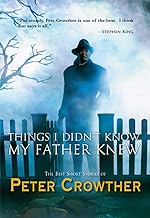THINGS I DIDN’T KNOW MY FATHER KNEW, Vol. 1

by Peter Crowther
Cemetery Dance Publications
(www.cemeterydance.com)
506 pages, $30
ISBN 978-1-58767-792-2
Click here to purchase
THINGS I DIDN’T KNOW is a fantastic collection.
Here are the best stories:
“Elmer.” Ozzie Masylik was just an ordinary boy living in Pecatonica, who, one day, in April 1946, witnesses what looks like a meteor crashing in a ravine, unleashing hundreds of “amoeba things.” He picks one of them up, cradling it carefully in his hand, and he calls the thing “Elmer.” Is Elmer a creature from outer space? Ozzie soon finds out what kind of properties and powers Elmer has when the amoeba thing figures out how to have save a life.
In “Too Short a Death,” one man seeks to discover the location of poet Harry Weldon Kees after he is reported missing from his abandoned car at the north end of the Golden Gate Bridge. Did he become a victim? Did he jump? The one man tracks down someone who knows, and Kees was alive, to a certain point, anyway, but his being missing has to do with a close friend, Robinson, who happens to be a vampire.
The title story centers on Bennett Differing, who encounters a visitor, a man in a trenchcoat and a hat, who seems to appear out of a fog. He resembles his father, answering questions only his father would know. Do ghosts have to visit every once in a while to help them remember who, exactly, they are?
“Cold Comfort.” City detectives are puzzling through a rash of murders of very old ladies on a distant hunch: They believe they found their killer, as unlikely as it could be.
“Surface Tension.” On a moon of the planet Orgundy, earth explorers encounter semi-intelligent, rock-like beings who attack and eat humans. The story resembles “The Thing” by John W. Campbell. It is horrifying and grizzly.
“Sitting Pretty.” A chair that was once majestic gets passed down through generations and several eras, a chair haunted by its past.
“We’re All Bozos on this Bus.” A bus on a Connecticut highway is full of repugnant and ugly people that one passenger, Frank, experiences. What kind of bus is he on? Where is it going and why?
“Tomorrow’s Eyes.” The use of a story gimmick, in this case, baubles, has a card shark winner on the eyes, and sees a dark future in store for himself. The card shark must “lose” the eyes, but how? Their power to foretell the future is too dangerous for the card shark.
“Late Night Pick Up.” A man who may have been captured by aliens endures questions by policemen. But are the cops what they seem?
“Songs of Leaving.” An asteroid named Fat Tuesday will soon wipe out civilization on earth, but not before some spaceships depart. At the final day, the dead are resurrected to join the living in celebration of life on earth one last time.
“The Second Lady.” Woodrow Wilson’s wife detects the ghost of a woman wandering about the White House grounds, and quickly disappears. Who is she? Why is she on the grounds?
“Days of the Wheel.” This is obviously an homage to one of the great American fantasists, Ray Bradbury. Yet instead of the curiosities that included the Waukegan, Illinois, of Bradbury’s youth, the tale of the Carney coming to town is in Forest Plains.
“The Doorway in Stephenson’s Store.” A big corner book collector and his wife are on a car trip when engine troubles force them to stop at Stephenson’s General Store. They walk into a time portal that takes them to the summer of 1956, where the collector, Jeff, can buy mint condition copies of some rare books. But for what purpose? And can they return to THEIR time in 1981?
“Leaves.” Jack, his wife and son notice leaves suddenly appearing inside the house, where they shouldn’t be. Is evil encroaching on their home?
“Front-Page McGuffin and the Greatest Story Never Told.” A man, undead, visits a favorite watering hole. He is dead, but all his superstitious behavior has kept him alive. Until one good friend helps him, finally, rest in peace.

